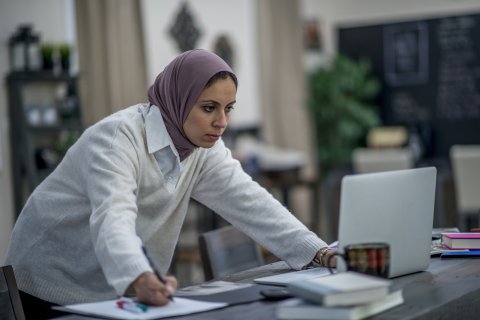Revitalising shrinking regions by attracting migrants
Horizon 2020 grant of €3 million
Migrants and refugees should be facilitated to settle in those places where they best fit and optimise the chances for successful integration instead of current top-down ‘distribution’ over Europe, say Utrecht University development geographers. The researchers have received a Horizon 2020 grant of €3 million to look into the possibilities to revitalise shrinking areas by hosting non-EU migrants. With this consortium they will follow local, bottom-up initiatives that stimulate integration of migrants, while revitalizing rural regions that currently face severe population and economic decline.

The international consortium Welcoming Spaces will investigate new ways to merge two policy challenges: how to contribute to the revitalisation of shrinking areas in Europe, while also offering space for the successful integration of non-EU migrants. For this purpose the researchers have selected fifty examples of ‘Welcoming Spaces’ across Europe. A Welcoming Space is a local initiative to attract migrants and revitalize the region.
Turning the tide in Riace
Across Europe many villages and small towns have set up Welcoming Spaces to stimulate job creation, improve social wellbeing or use vacant real estate for housing refugees. One of these Welcoming Spaces is Riace, a village in the Italian mountains facing severe population loss. The village’s mayor decided to turn the tide and started focussing on welcoming a controlled number of migrants, who live and work as part of the community. As a result both the town's population and economy slowly rebuilt. In addition, the mayor of Riace was elected as one of the world's 50 greatest leaders by Fortune magazine in 2016.
Different perspectives
The aim of ‘Welcoming Spaces’ is to create a platform that makes these examples visible and allows practitioners and researchers to learn from successful and unsuccessful approaches in a wide variety of geographical, political and social contexts. The selected examples will be analysed from different perspectives, varying from representations of the public discourse and media, geographic and institutional contexts and the local-migrant capacity to act.
About Welcoming Spaces
Welcoming Spaces is coordinated by Prof. Annelies Zoomers (principal investigator), Dr Maggi Leung, Dr Karin Geuijen, Dr Marlies Meijer and Dr Bianca Szytniewski. Also Utrecht University researchers Prof Barbara Oomen, Prof Tine de Moor, Dr Ilse van Liempt and Dr Sergio España are involved as project members.
Utrecht University leads this research project that is on the crossroads of two of its strategic themes: Institutions for Open Societies (IOS) and Pathways to Sustainability. The research will be carried out by a multidisciplinary team of academic and non-academic partners from the Netherlands, Germany, Spain, Italy, and Poland. The proposal has been written with an IOS seed money grant. It builds on research carried out by the Urban Futures – Transmobilities research programme at the department of Human Geography and Spatial Planning, and the Future of Citizen Based Initiatives hub of IOS (FOCI).

